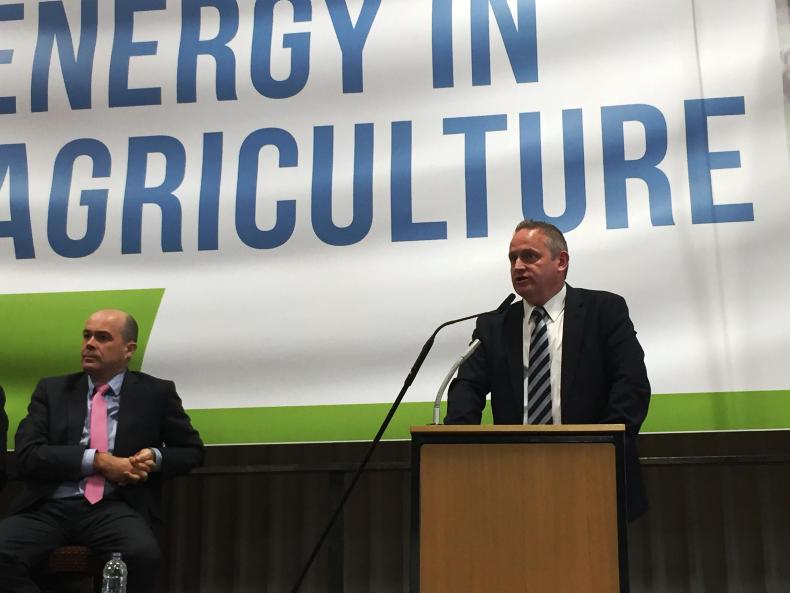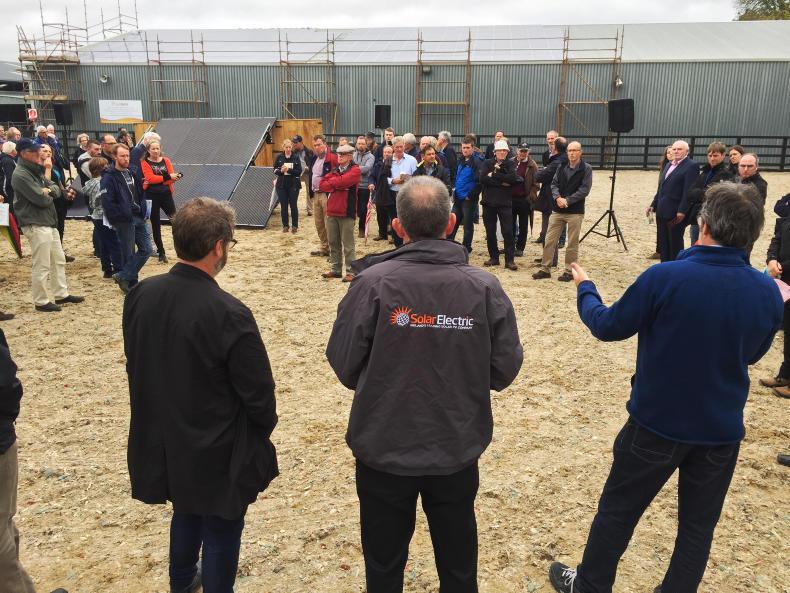Minister for Communications, Climate Action and Environment Denis Naughten said he would bring the much-awaited renewable heat incentive (RHI) scheme to cabinet early next month, before it goes on to the European Commission for approval under State aid rules. “The reason for the delay is to ensure safeguards to avoid replicating the mistakes made in other jurisdictions,” Minister Naughten told several hundred farmers and energy industry representatives attending the event at Gurteen College, Co Tipperary.
Controversy over the cost of a similar scheme in Northern Ireland led to the collapse of the Stormont executive earlier this year.
“I see the renewable heat incentive scheme increase demand for domestic biomass by 110,000t per year,” Minister Naughten added. He said the scheme would cover biomass boilers, heat pumps and anaerobic digesters.
I understand the frustration of the people in relation to the slow movement in this area
The minister also said that a consultation on the separate renewable electricity support scheme, previously announced for July, would open in the coming week. This scheme will set the price paid to new entrants selling electricity to the national grid from sources such as wind or solar. Minister Naughten said it would focus on community involvement in renewable energy projects and cover micro-generation from installations such as roof-mounted solar panels.
 ”I understand the frustration of the people in relation to the slow movement in this area,” he said. “This is going to change. I am getting support across cabinet,” added the minister (pictured, left).
”I understand the frustration of the people in relation to the slow movement in this area,” he said. “This is going to change. I am getting support across cabinet,” added the minister (pictured, left).
Bord na Móna long-term contracts
Bord na Móna managing director Mike Quinn (pictured, right) announced that his company’s new bioenergy division would develop a market for crops such as willow. “Bord na Móna Bioenergy will offer long-term contracts of up 15-years to project developers. We will handle all logistics,” he said. The company confirmed that similar durations would apply to farmers contracting energy crop supplies.
Quinn said Bord na Móna aims to become the largest biomass supplier in the country, starting with the conversion of its own three peat power stations – one already burning 40% biomass and the other two applying for planning permission in the coming weeks for similar conversions. While Quinn said the company’s goal was to source 100% domestic biomass, it would import products such as wood chips from the US and other countries until Irish suppliers develop.
Now we need action. It cannot come soon enough
While he welcomed the additional clarity on RHI, IFA renewables project chair James Murphy said: “Now we need action. It cannot come soon enough.” He added: “It’s not going to be easy to convince farmers to grow energy crops because we had bad experiences in the past.”
Co Cork dairy farmer Brendan Hinchion, who is looking into anaerobic digestion from cattle slurry with neighbouring farmers, also expressed frustration. “We’ve heard no announcement really that farmers can exploit at farm level,” he said.
Renewable planner Damien Collins was of the same view: “We’re all disappointed with the minister’s announcement this morning. Uncertainty is a killer in this industry.” Russell Smyth, a corporate finance director in KPMG who specialises in raising finance for renewable energy projects, added: “Without the pricing of RHI, it is impossible to start putting business plans together.”
Solar inside the farm gate
While they wait for policy announcements, farmers are showing increasing interest in smaller energy projects that make sense within the farm gate. Gurteen College displayed new solar panels currently being installed on the roof of one of its sheds at a cost of €50,000. The system will save the campus €6,750 in electricity bills every year.
Robert Goss of @Paulsolarelec presents Gurteen College's new shed roof solar panels at @EnergyinAgri pic.twitter.com/ncIIjJpIXj
— Thomas Hubert (@tom_hubert) August 22, 2017
A trailer fitted with solar panels and batteries was also on show, which can bring enough power to light up an isolated area for eight to 10 hours.
With the cost of solar panels and batteries going down constantly, producing, storing and using energy on farm is on the point of becoming a viable option. “I have no doubt that by 2020 this will be a feature of every farm,” said Paul Kenny, chief executive of the Tipperary energy agency.
Listen to an interview with Minister Naughten on our weekly podcast this Friday and read more about what farmers can expect from upcoming renewable energy schemes in the Irish Farmers Journal this Thursday.






 This is a subscriber-only article
This is a subscriber-only article











SHARING OPTIONS: